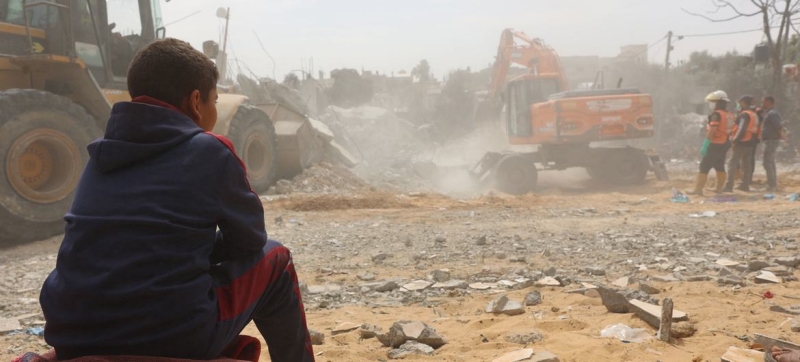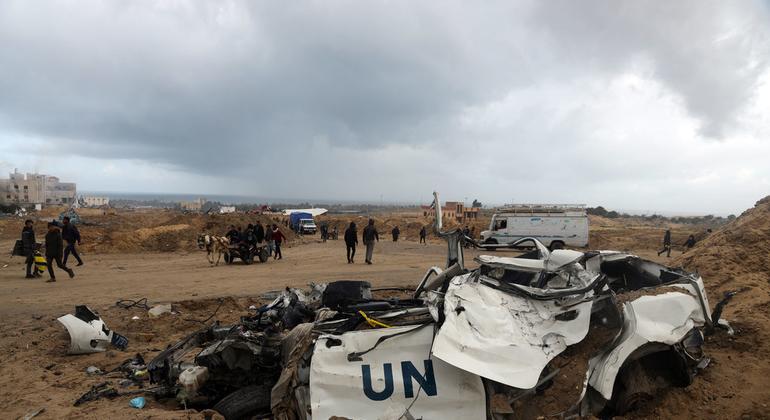
A child watches the clearing of rubble in Rafah. UN Human Rights Council calls for arms embargo on Israel Peace and Security
The UN Human Rights Council (HRC) adopted a resolution on Friday condemning Israel’s alleged use of starvation as a method of warfare in Gaza and calling for an arms embargo on Israel.
In the resolution, which was adopted by 28 votes in favor, six against and 13 abstentions, the 47-member Council supported a call to “end the sale, transfer and diversion of weapons, ammunition and other military equipment to Israel, the occupying Power… to prevent further violations of international humanitarian law and human rights violations and abuses.”
Read also:
EXPLAIN | What is the UN Human Rights Council?
Pakistan, on behalf of the Organization of Islamic Cooperation, proposed a resolution, citing the need to stop “egregious” human rights violations in the Occupied Palestinian Territory. The text was co-authored by Bolivia, Cuba and the State of Palestine, and during the voting this document was supported by more than two dozen countries, including Brazil, China, Luxembourg, Malaysia and South Africa.
Unlike UN Security Council decisions, HRC resolutions are not legally binding on states, but they carry great political weight. In this case, the document could be used to increase diplomatic pressure on Israel, as well as potentially influence decisions within countries.
No votes
The resolution condemns Israel’s use of wide-area explosive weapons in populated areas of Gaza and highlights the devastating impact such weapons have on hospitals, schools, water supplies, electricity and housing, affecting millions of Palestinians.
Representatives of Germany, which voted against the bill, noted that the resolution does not mention Hamas and denies Israel its right to self-defense.
Germany also criticized Israel’s “biased” accusations of “apartheid” and “collective punishment, deliberate attacks on Palestinian civilians and the use of starvation as a method of warfare.”
Israel’s permanent representative to the UN in Geneva, Meirav Eilon Shahar, called the document further evidence of the council’s alleged anti-Israel bias. “Under this resolution, states cannot sell weapons to Israel to protect its population, but they can continue to arm Hamas,” she said.
The diplomat said the council had failed Condemn the October 7 killings of more than 1,200 Israelis, the kidnapping of more than 240 people by militants, and the mutilation and sexual violence against Israeli women, children and men.

Use of AI for military purposes
Among other things, the resolution adopted by the Human Rights Council condemns the use of artificial intelligence (AI) for decision-making in conflict situations, as this may lead to the commission of international crimes.
The document condemns all attacks on civilians, including in Israel on October 7, 2023, and demands the immediate release of all remaining hostages, arbitrarily detained persons and victims of enforced disappearances, and ensuring immediate humanitarian access to hostages and detainees in accordance with international law.
On the last day of the session, the Council also adopted other resolutions relating to the situation in the Occupied Palestinian Territory (OPT), in particular on issues of accountability and justice, the Palestinian right to self-determination, Israeli settlements in the OPT and the Occupied Golan Heights.
Gaza Strip in Focus
At the opening of the 55th session of the Council, the UN Secretary-General once again called for a humanitarian ceasefire and immediate and unconditional release all hostages.
“Nothing can justify the deliberate killing, injury, torture and abduction of civilians, the use of sexual violence and indiscriminate rocket attacks on Israel,” Antonio Guterres said then. “But nothing justifies the collective punishment of the Palestinian people.”
Presenting his report on justice and accountability in the OPT, UN High Commissioner for Human Rights Volker Türk called for an end to the “carnage” in Gaza.
Read also:
Turk on UN Human Rights Council meeting: Gaza “carnage” must end
“All sides are committing clear violations of international human rights and humanitarian law, including war crimes and , possibly other crimes under international law,” said Turk.
Special Rapporteur on the situation of human rights in the Palestinian Territory occupied since 1967, Francesca Albanese presented her report to the Council, in which she noted that “there are reasonable grounds to believe that the threshold indicating that a crime of genocide has been committed against the Palestinians as a population group in Gaza.”
Human rights in the world
During the session, the HRC examined many serious human rights violations, including in Iran and Haiti. An independent international fact-finding mission investigating protests in Iran has reported egregious abuses by Iranian authorities in the aftermath of the death of Gina Mahsa Amini in September 2022.
The Council extended for another year the mandate of this mission, as well as the mandate of the Special Rapporteur to monitor the situation of human rights in Iran.
As for Haiti, the Council heard a report from the UN Human Rights Office. Thus, the UN High Commissioner for Human Rights Volker Türk emphasized the need to intensify actions against the backdrop of escalating violence that deeply affected the country’s population. The Council extended the mandate of the human rights expert in Haiti.
In addition, the mandates for investigations in Ukraine, Syria and South Sudan were extended.
The Council adopted a number of resolutions on various thematic areas, including a resolution calling on states to combat discrimination and violence against intersex people.
The mandate of the Special Rapporteur on human rights and the environment was also extended and will now be known as the Special Rapporteur on the human right to a clean, healthy and sustainable environment. This reflects the recognition of this right by the UN Council and General Assembly.
